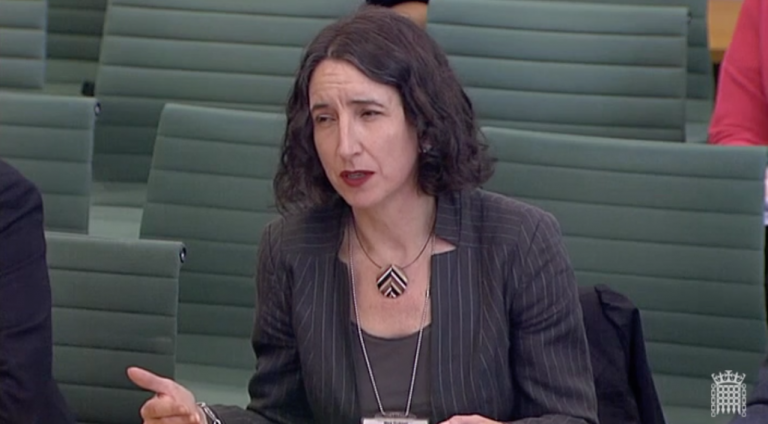Prof Meg Russell gives evidence to the Liaison Committee on the effectiveness of Select Committees
30 April 2019

On 29 April 2019 Constitution Unit Director Professor Meg Russell gave oral evidence to the House of Commons Liaison Committee. The Committee, which coordinates and reviews the work of the chamber's committees, is currently conducting an inquiry into the effectiveness and influence of the select committees, 40 years on from the establishment of the departmental select committee system and 10 years on from proposal of the 'Wright committee' reforms into how committee chairs and members are chosen. Meg appeared alongside Dr Hannah White, Deputy Director of the Institute for Government, Dr Ruth Fox, Director of the Hansard Society, and Professor Tony Wright, former chair of the Select Committee on Reform of the House of Commons ('Wright committee') and Emeritus Professor of Government and Public Policy at University College London.
Watch a short video of some key points that Meg made:
Read a summary of all the key points from Meg's evidence:
- Committees have now reached the point of maturity where they are high-profile players. This puts them in a somewhat vulnerable position where they are more subjected to scrutiny themselves, and subject to possible criticism. Therefore, a key focus for the inquiry might be how committees' reputation can be protected and maintained
- Now that committees are better resourced there are some risks of both duplication between inquiries and overambitious chairs/committees taking on too many inquiries, possibly putting committee staff under great pressure. There are tricky questions about the role of the Liaison Committee in regulating these matters and ensuring coordination.
- One of the weaknesses of committees is their lack of ability to commission research – due both to resource constraints and the speed with which inquiries often need to be conducted.
On the issue of committees' relationships with the public, Professor Russell noted that
- Public engagement is increasing, and welcome, but also brings challenges. There are risks of overwhelm from multiple public submissions, and also risks that the voices heard by committees are unrepresentative. Alternative means of engaging with the public and ensuring representative voices would be to commission focus groups, citizens' juries or deliberative polling.
- To improve public engagement, committees could also more actively canvass views from the public in general, and from specialist audiences, about the priority topics for future inquiries.
Regarding the process of giving evidence and the autonomy of committees, she argued that
- The balance between freedom and regulation is a difficult one to strike. The experience of giving evidence can sometimes be uncomfortable for witnesses, with some committee members asking left-of-field questions. But the question of whether anything can or should be done to regulate this in a democratic system is extremely difficult.
- It is worth noting that House of Lords Committees often send witnesses questions in advance, making the experience less intimidating.
Concerning accountability she commented that
- Committee chairs are now powerful figures with a clear cross-party mandate, and this has strengthened the committees and parliament as a whole in positive ways. But, there is limited accountability for chairs after election. One possibility would be to strengthen relationships between committees and the chamber through, for example, enabling chairs to be questioned on reports. This would improve both committee visibility and accountability.
Concerning influence, she concluded that
- The nature of influence is subtle, and goes far beyond the acceptance by government of recommendations in committee reports. For example, ministers and civil servants carefully think through policy options in advance and whether these would withstand public committee scrutiny. These 'exposure' effects extend not just to government, but now also to private bodies (e.g. in recent inquiries on banking, tax evasion and fake news). In thinking about committee influence it might be useful to ask the counterfactual 'what if select committees didn't exist?'. There are key examples of issues and evidence that would otherwise not come to the public eye.
- Select committees also have a key role in informing parliament, and changing the culture of parliament, to encourage a more evidence-based approach and more cross-party working. Notably, Constitution Unit research found that in debates on government bills, select committees were mentioned on average 140 times.
- Looking around the world, UK select committees perform extremely well in terms of accountability and the capacity to conduct detailed inquiries. In many other comparable systems specialist committees fill much of their time with scrutiny of government bills, and consequently are far more politicised.
Related links:
Click here to watch the full evidence session on Parliament.tv >
Visit the House of Commons Liaison Committee Inquiry page >
 Close
Close

